66th Commission on the Status of Women
-
March 13, 2022 - March 25, 2022
- Online
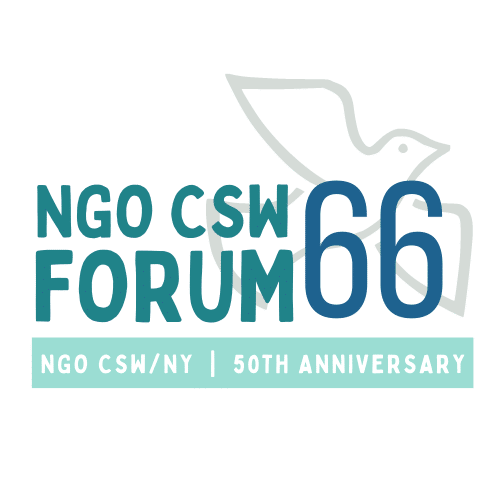
The 66th session of the Commission on the Status of Women (CSW), a functional commission of the United Nations Economic and Social Council (ECOSOC), took place from 13-25 March in a hybrid format with virtual meetings. The main theme: achieving gender equality and the empowerment of all women and girls in the context of climate change, environmental and disaster risk reduction policies and programmes. As agreed in the conclusions of the 61st session, the review theme is women’s economic empowerment in the changing world of work.
This year is NGO CSW/New York’s 50th Anniversary!
Workers leaders and representatives of the International Domestic Workers Federation (IDWF), HomeNet International, StreetNet International and WIEGO participated during the virtual conference parallel events.
|
Home-Based Workers: The Essential Link in Supply Chains In many domestic and global supply chains, a critical part of production is carried out by an invisible workforce — women home-based workers. This session will be a panel discussion on the role of home-based workers within these chains, the challenges they face, their approaches, and policies that effectively safeguard their rights and livelihoods. The session will provide a rare opportunity to hear from home-based workers’ representatives from South Asia, Southeast Asia, Africa and Latin America, as well as experts who will share their experiences, strategies and good practices from around the world. |
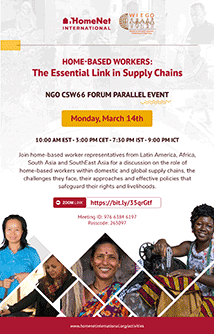 |
Centring Women Workers in Climate Justice Advocacy
Organized by the Solidarity Centre, co-sponsored by HomeNet International, StreetNet International and the Global Alliance of Waste Pickers
Environmental degradation has exacerbated gender inequality and amplified existing inequities that result from resource scarcity, natural conflict and climate-related displacement. The shift toward precarious employment, coupled with increasing community vulnerabilities to climate-related impacts and environmental degradation from highly profitable, polluting industries, puts workers and their communities at greater risk. Confronting these challenges and ensuring that women’s voices and needs are meaningfully included in climate change solutions requires collective organizing and collective action to chart a just, inclusive world of work. Join trade union women and activists to advance inclusive, intersectional and gender-responsive climate solutions and end GBVH, from the workplace to national policy.
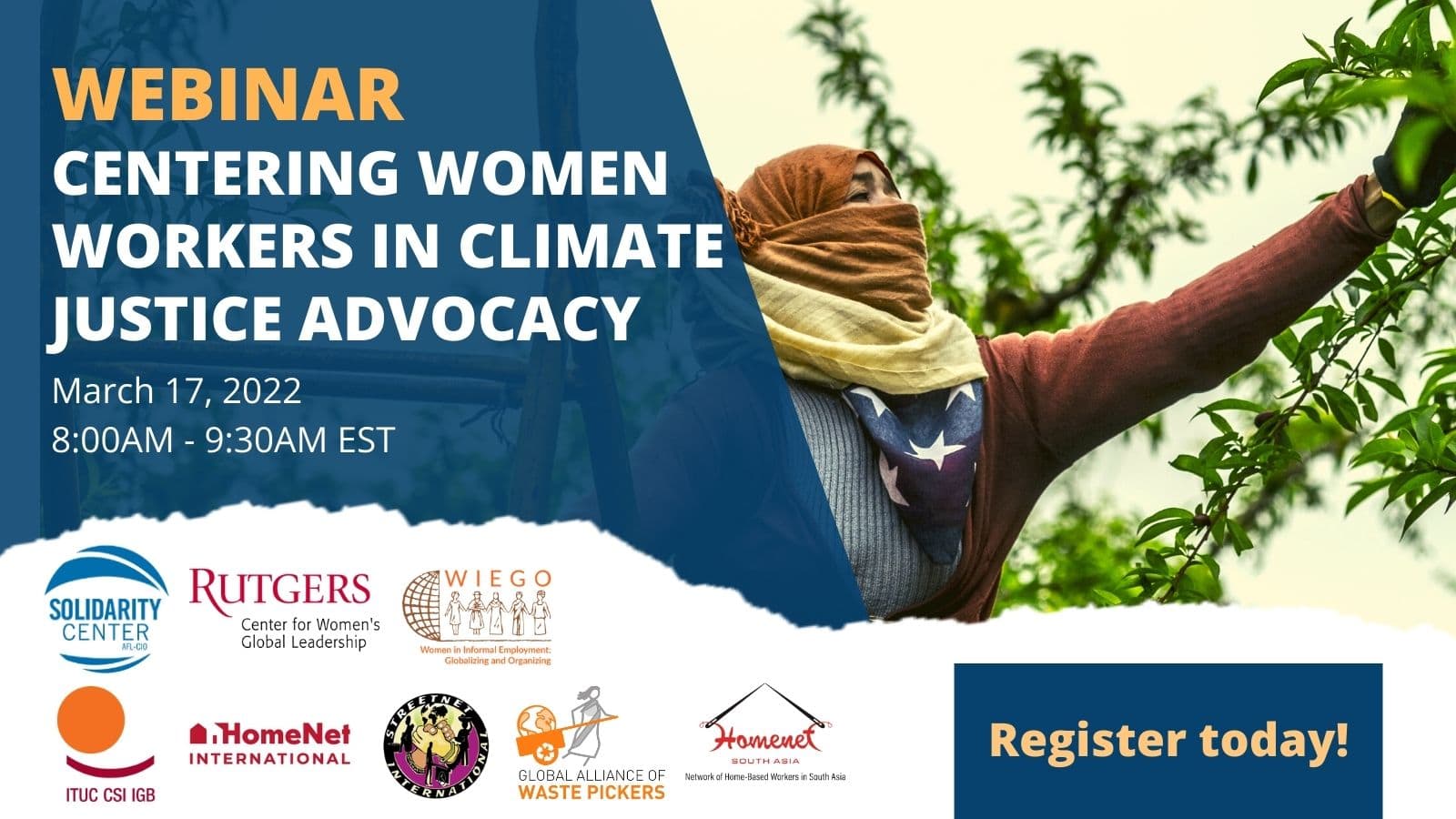
Other languages: French, Hindi, Portuguese, Russian and Spanish
Climate Change is a Labour Issue: Domestic Workers’ Demands
Organized by the International Domestic Workers Federation
Climate change affects not only biodiversity loss, deforestation and land use, but also entire labour sectors, acting as an exacerbator of existing risks and endangering domestic workers by exposing them to health risks. Many domestic workers used to work the land as farmers and suffer the impacts of the contamination of lands, rivers and a weakened ecosystem, unable to reduce virus emergence. Domestic workers are exposed in multiple ways – coming from rural backgrounds; living in crowded, unsanitary conditions; handling waste within households. Domestic workers also migrate through unsafe pathways in environmental-crisis-induced conflicts. This panel elaborates linkages between climate change and our sector through domestic worker experiences, covering different regional contexts.
Other languages: BHS IND, French, Spanish and Tagalog
There is No Recovery Without Informal Workers
Organized by the International Development Research Centre (IDRC), co-sponsored by WIEGO
Informal workers around the world – accounting for over 60% of global employment – have been hard hit by COVID-19. Occupying the most vulnerable form of employment within the informal economy and shouldering disproportionate burdens for unpaid care, women are bearing the brunt of the social and economic fallout of the pandemic. Drawing on new data from across 11 cities, this panel will examine the gendered pathways to recovery, what national and municipal governments are doing right — and wrong — to support a gender-inclusive recovery, and promising innovations to build resilience and boost livelihoods for women informal workers in the changing world of work.
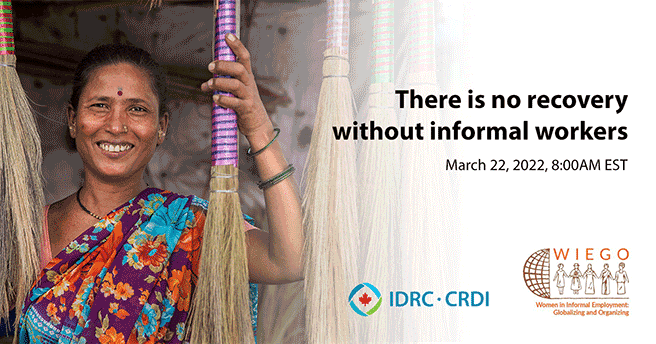
Why COVID-19 recovery must be gender-responsive
Organized by the Institute of Development Studies, co-sponsored by IDRC and WIEGO
Over the last 18 months, a clear body of evidence has emerged to demonstrate the differing impacts of COVID-19 on women, girls, boys, men and non-binary genders. What has become increasingly evident is the importance of locating the gender impacts of the pandemic within a broader landscape of structural, intersecting social and economic inequalities. This panel discussion will delve into the evidence generated by the COVID-19 Responses for Equity (CORE) research initiative. Speakers will explore the impact the pandemic is having across the most vulnerable groups, how gender intersects and often exacerbates these effects and what recommendations for future policy responses have emerged. Read more
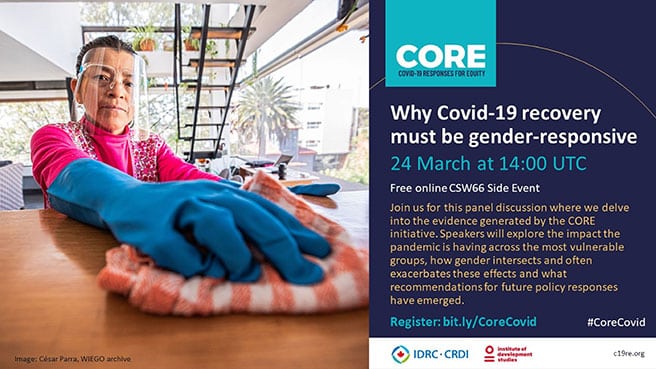
In addition to the parallel events, the Virtual Artisan Fair is an online marketplace on the NGO CSW66 portal. This is a space where artisans and attendees from around the world sell their goods. Don’t miss this opportunity to see a variety of goods available from home-based workers.
There is No Recovery without Informal Workers – COVID Recovery and Post-COVID Reforms: Demands of Informal Workers Organizations. WIEGO, 2021. Read here
There is No Recovery without Informal Workers. International Development Research Center (IDRC), December 2021. Read here
Evidence reveals burdens borne by women informal workers during the pandemic, IDRC. 07 March, 2022. Read here
COVID-19, Informal Workers and WIEGO’s Work during this Crisis. Read here
COVID-19 Crisis and the Informal Economy Study: Policy Insights. Read here
Top 5 Lessons from the COVID-19 Pandemic in 2021, WIEGO Blog, 2022. Read here
Jenna Harvey, 2019. Homeworkers in Global Supply Chains: A Review of Literature. WIEGO Resource Document No. 11. Read here
Decent Work for Homeworkers in Global Supply Chains, Platform of Demands, WIEGO. Read here
Homeworkers in Global Supply Chains, A Platform of Demands to the European Commission in the context of the proposed legislation governing Sustainable Corporate Governance in Global Supply Chains, Submitted by HomeNet South Asia, HomeNet South East Asia and WIEGO. 07 Feb 2021. Read here
Homeworkers in Garment Supply Chains: Research from India and Nepal. HomeNet South Asia, 2021. Read here
From factories to homes: Why human rights due diligence must extend to all workers in the supply chain by Marlese von Broembsen, WIEGO. Business & Human Rights Resource Centre, Blog 2022. Read here
IDWF events around the UNCSW 66th Session. Read here
IDRC panels at the NGO CSW Forum. Read here